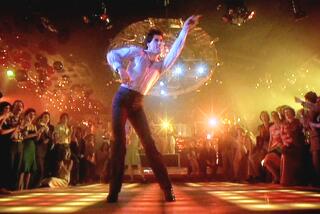‘Shall We Dance?’: A Charmer Hard to Resist
- Share via
Every once in a while a foreign film comes along that seems to be able to connect to that larger audience that normally doesn’t care to sit still for subtitles.
“Cinema Paradiso,” with its love of movies, and “Like Water for Chocolate,” with its love of food (and romance), were two such films. “Shall We Dance?” just might be another. Most everybody, after all, loves to dance or watch dancing.
Even more than Australia’s “Strictly Ballroom,” Masayuki Suo’s “Shall We Dance?,” which won all 13 of Japan’s equivalent of the Oscars, is much more than a lot of dazzling rug-cutting. World-class charmer that it is, it is also a wry comment on the way a tradition of impassive formality can inhibit ordinary Japanese people in their daily lives even as the 20th century draws to an end.
Tokyo office manager Shohei Sugiyama (Koji Yakusho), while riding a commuter train, glimpses a beautiful young woman peering somberly out the window of a fourth-floor ballroom dancing school. It’s an image that recalls an Edward Hopper painting and has such an impact on him that he eventually will feel compelled, despite overwhelming feelings of shyness and self-consciousness, to seek her out.
At 42, Shohei is a settled man, with a wife (Hideko Hara) and daughter (Misa Shimizu) and a recently acquired house in the suburbs that he worked very hard to afford and will take a long time to pay off. He doesn’t enjoy the after-hours drinking typical of many Japanese office workers, and he’s hit a vaguely bored and dissatisfied passage in his life.
The strangely sad young woman, Mai (Tamiyo Kusakari, a top ballerina in Japan and the director’s wife), proves to be very cold and, later on, even brutal to him. But Shohei goes ahead and signs up for a Wednesday evening group class, a decision that will transform both their lives in ways neither they nor we could predict.
Painfully awkward, Shohei struggles manfully to master the traditional ballroom dances under the kindly instruction of a pretty, smiling middle-aged woman, Tamako (Reiko Kusamura). (He can’t afford Mai’s individual lessons.) Gradually, Shohei starts to relax, to move gracefully, to improve his posture and to emerge as the tall, slim and handsome man that he actually is. On the dance floor and off, Yakusho is a marvelously self-effacing actor, heading an outstanding cast.
At first, Shohei’s wife, Masako, is so reflexively traditional in her thinking that, sensing her husband’s malaise, she worries that he’s not staying out late and having fun. But when it’s soon clear that there’s a new happiness and contentment in him, she automatically suspects he’s having an affair.
Not quite so old school as to resign herself to that possibility, she nevertheless finds it easier to hire a private detective than to ask him what’s going on, and Shohei in turn is much too embarrassed to admit to her that he’s doing something so radical as taking ballroom dancing lessons. Why, that would be tantamount to asking your own wife to dance!
Shohei and Masako, in short, are caught up unconsciously in a Japanese concept of marriage so old-fashioned that it wouldn’t occur to them to be full-fledged partners in their relationship, sharing experiences, any more than it would be to be partners merely on a dance floor.
Suo sandwiches these serious observations in lots of humor and swirling waltzes. As did classic Hollywood comedies of the ‘30s, “Shall We Dance?” has a pair of second leads as a source of much humor and some poignancy.
Naoto Takenaka plays one of Shohei’s employees, unexpectedly a classmate, equally secretive but determinedly flamboyant--the tango is his specialty--on the dance floor. Often the most vibrant presence on screen, Eriko Watanabe is Toyoko, a plump, outspoken middle-aged woman who supports herself and her daughter with several menial jobs and dreams of becoming a ballroom dancing champion.
Suo shrewdly bides his time in allowing ice princess Mai to melt and confront the reasons for her own unhappiness.
“Shall We Dance?” is a great-looking, great-sounding film, and Yoshikazu Suo’s lilting, sometimes wistful score is a major component in the picture’s success. You don’t want to sit this one out.
* MPAA rating: PG, for mild language. Times guidelines: The film is suitable for everyone old enough to read subtitles.
(BEGIN TEXT OF INFOBOX / INFOGRAPHIC)
‘Shall We Dance?’
Koji Yakusho: Shohei Sugiyama
Tamiyo Kusakari: Mai Kishikawa
Naoto Takenaka: Tomio Aoki
Eriko Watanabe: Toyoko Takahashi
Hideko Hara: Masako Sugiyama
A Miramax presentation of an Altamira Pictures production. Writer-director Masayuki Suo. Producer Yasuyoshi Tokuma. Executive producers Hiroyuki Kato, Seiji Urushido, Shigeru Ohno,, Kazuhiro Igarashi, Tetsuya Ikeda. Cinematographer Naoki Kayano. Editor Jun’ichi Kikuchi. Music Yoshikazu Suo. Production designer Kyoko Heya. Running time: 1 hour, 58 minutes.
* At selected theaters in Los Angeles and Orange counties.
More to Read
Only good movies
Get the Indie Focus newsletter, Mark Olsen's weekly guide to the world of cinema.
You may occasionally receive promotional content from the Los Angeles Times.










